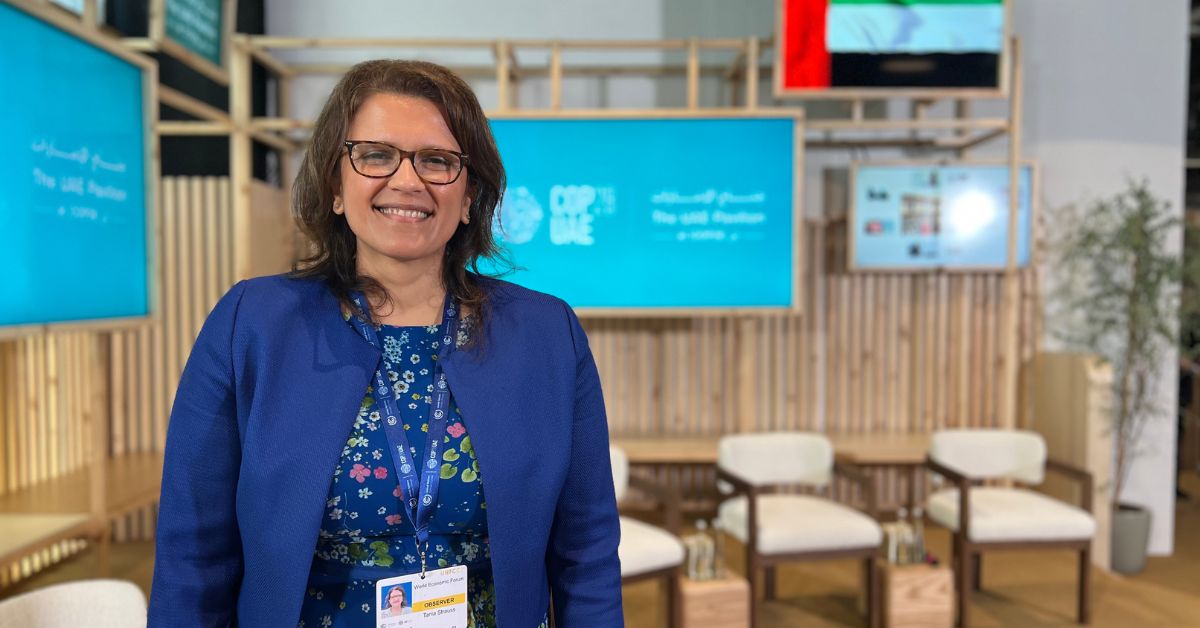DUBAI, UAE — The World Economic Forum (WEF), in cooperation with the UAE’s Ministry of Climate and Environmental Change and Mohammed Bin Rashid Al Maktoum Global Initiatives (MBRGI), has launched a UAE Food Innovation Hub to address challenges in the food industry linked to climate change.
This hub, the sixth in the WEF’s global network, aims to collaborate closely with various partners and stakeholders to share ideas, conceptualize, and implement new strategies to reduce the food industry’s carbon footprint, impacting all aspects of the food supply chain.
During the official launch at COP28 in the UAE, Tania Strauss, Head of Food and Water at the World Economic Forum, told TRENDS the significant role of the UAE government’s eagerness in accelerating the hub’s development.
“In the UAE, we are seeing a huge appetite from the government, corporate sector, and stakeholders to leverage innovation at scale. What’s exciting is that, even though this is the sixth innovation hub in our global network, it’s likely to advance quite quickly due to the high level of commitment from these partners,” she said.
Strauss highlighted the pivotal role of the UAE Minister of Climate Change & Environment, Mariam Almheiri, in the process. “Her commitment to the role of innovation and changing the food systems, as they’re not evolving fast enough, and addressing some of the major bottlenecks in the UAE, led us to leverage the opportunity of the WEF’s global initiative,” Strauss said.
She added that MBRGI’s involvement as one of the founding partners and its support for the wider global network were key factors in replicating the Hub model in the UAE.
The six Food Innovation Hubs worldwide unite all parties involved in the farm-to-fork model, a point that was emphasized multiple times during the launch press conference at COP28.
The overarching Global Food Innovation initiative, launched in 2021 in collaboration with the government of the Netherlands, the World Economic Forum, and several partners, recognizes the need to utilize technology solutions and the ecosystem of innovation that enables the scale and adoption of those solutions.
“Today we have a number of technologies available and working, but not at scale,” Strauss said. “Part of the challenge is that not all the technologies are fit for purpose in the different ecosystems where they need to have the greatest impact. So, how do we ensure that we’re not just focusing on technology, which is very important – we love tech – but it’s less about the tech and more about innovating the way we partner with them. What are the enabling ways in which we can have a farmer-centric, demand-driven, fit-for-purpose approach that will actually change the way we look at the role of technology?”
As technology permeates each stage of the supply chain process, it not only informs growers of the best eco-practices but also becomes a catalyst for transformative change by using data to foster sustainability.
‘Tech is important across the value chain, from the growers themselves, helping them to understand the best and most sustainable practices. This allows them to grow food sustainably, build their own resilience, improve livelihoods, and yield better results,’ Strauss pointed out.
“On a consumer level, tech helps people understand what they’re eating, where it came from, how it was produced, and everything in between to make everything work well. Currently, our food systems are unable to do that, and we see the impacts, whether it’s through people living in hunger, malnutrition, or even obesity. So, these technologies introduce data that can help make more informed decisions but also offer solutions to unlock problems, like how to use more regenerative practices for precision agriculture, or how to utilize emerging tech like AI for real-time decision-making on the ground, which we didn’t have before,” she added.
New technology in the food industry is expected to be readily available to consumers, who, thanks to AI, will be able to trace their food, see its origins, understand how it was produced, and assess its health implications.
Strauss emphasized that the key to the success of the UAE Food Innovation Hub is the collaboration between public and private sectors. “When they’re working together, you can feel the buzz. For example, when discussing growing strawberries in the UAE to reduce the carbon footprint—a topic mentioned during the launch press conference—colleagues with trade experience said, ‘Look, does it make sense to grow these in different seasons here, or is it more efficient and sustainable to do it in smart ways? We have the technical capability to show you how.’ The response from the partner was, ‘Okay, you’re the expert, so let’s talk.’ That’s the kind of collaboration we want to foster.”
Work has already begun in terms of defining the stakeholder roles and the ecosystem of the UAE’s new Food Innovation Hub. The WEF plans to return to Dubai in May 2024, along with other partners, to share ideas and discuss progress updates.









